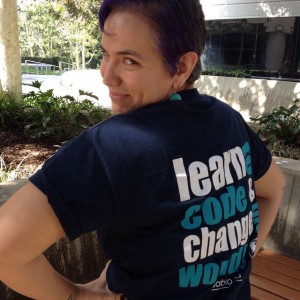
Of the many, many things that I’ve learned during my time as a Sabio Fellow, the one that stands out the most to me is how learning to code has made me a better person. Diving into a system with new rules and expectations forced me to be a lot more patient and understanding with myself — and by extension, those around me.
I’ve been an “overachiever” for as long as I remember; few things have been really “hard” for me to learn and grasp. But the type of frustration I’ve experienced learning to code can only compare with how overwhelmed and hopeless I felt in fourth grade when failing to understand how to multiply and divide fractions. That complete cluelessness and utter defeat that comes with not knowing how to do something, and having no hope that you ever will.
Part of the experience of learning has been realizing how much more there is to learn — the world of computer languages is, like the world of human languages, impossibly diverse and vast — and accepting that I can both know a lot of stuff, while also needing to learn much more, was crucial to my education.
After I accepted that the universe of coding wasn’t going to magically settle into my mind in a short amount of time, I found it became much easier for me to “excuse” myself for not learning as quickly as I wanted, or having to study a concept for longer than I would have liked. Instead, I learned to celebrate small victories, and take a long view of my progress.
Truth be told, I now know, anybody who is motivated to do so can learn to code. There are surely some very difficult concepts I’ve run into, but with time and a great teacher (which, I was lucky to have in Sabio’s Gregorio Rojas), nothing is going to elude me forever. And getting to that point where I can recognize my capabilities and give myself permission and time to achieve them really unlocked my learning potential.
It’s worth noting here that I’m not a computer scientist, nor do I have any desire to be. In my mind I’ve likened the difference between computer scientists and software developers/computer programmers to architects and those who build their creations: only a few people are laying the plans, everyone else is implementing them. There are a mind-blowing number of processes that take place for anything to happen on the Internet (the speed of light is, like, so fast). And while I have a basic understanding of that chain, underneath every process is an entirely different chain of processes seemingly ad nauseam, so I’m content to focus on being a developer and leaving the tough stuff to the folks who studied computer science for 10 years.
The upshot here is, once I learned to give myself some slack for my perceived educational shortcomings and more time to learn things, I found that I was more sympathetic and patient not just with myself — but with those around me. Just because you’re not good at something quickly doesn’t mean you’ll never be good at it.
I’m so grateful for the experience of learning the workings of the online world, and I’m excited to continue my education. What’s more, soon I’ll be interviewing and looking for work as a professional software developer, and I’m certain I’ll have much more to learn — but thankfully I’ll be going in with an attitude that will ensure I’m open to all that knowledge.






One Trackback
[…] reading Learning to code made me a better person by Sara Inés Calderón featured on Más […]